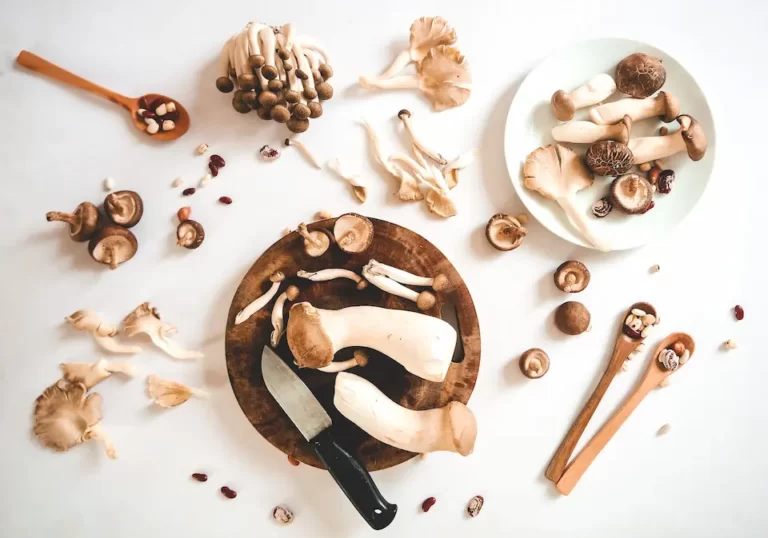But since mushrooms are powdered and then used in the coffee, you won’t exactly have mushrooms floating on top of the cup. Though real-life mushrooms can’t give you powers like the ones Mario gets, mushrooms still offer a lot of benefits for your body. But, what is mushroom coffee? the answer is you can mix this healthy element in your coffee.
We all know mushrooms, right? You know, the one that Mario consumes to grow bigger.

Let’s look at how mushrooms help and how well it goes with coffee to better understand the mushroom coffee trend.
Origins Of Mushrooms
The most popular types of mushrooms that get used for coffee are:
- Reishi
- Chaga
- Lions mane
- Cordyceps
Reishi

Reishi mushrooms have been part of medicinal practices forever. Asian countries used to use mushrooms and different herbs for wellness therapy. But rather than calling them “mushrooms,” these herbs were called “adaptogens” since they’re supposed to help us adapt to different intense situations and survive them.
Adaptogen properties of the Reishi mushroom can help with alleviating stress. Reishi doesn’t only boost your immunity; it also down-regulates your immune system if it’s overactive.
Chaga

Chaga mushrooms were part of Eastern European medicinal practices. You can find Chaga mushrooms in the forests of Finland.
Back in world war II, coffee was rationed among soldiers since it was short in supply. So instead, camps used to steep Chaga mushroom as a tea. It wasn’t precisely coffee, but it tasted just the same.
Chaga mushrooms contain compounds that help you balance your metabolism. Its antioxidants also support your immunity by acting as a natural adaptogen.
Lion’s Mane

Lion’s Mane mushroom is associated with Asia, Europe, North America, and its forests. Lion’s Mane mushrooms are used as both culinary and medicinal mushrooms.
Lion’s mane is native to the forests of North America, Europe, and Asia and is used as a culinary and medicinal mushroom there.
Lion’s mane mushrooms promote the growth and functions of your nerve cells. For example, lion mane stimulates the Nerve Growth Factor (NGF). NGF offers you neurological support, fixes memory, and offers you concentration.
Cordyceps

Though this name can give you an ominous flashback to a certain scenario, the real-life version of this mushroom is actually helpful.
This mushroom has been part of traditional Chinese medicine for centuries and is used to treat complicated conditions like liver and kidney issues, tumors, respiratory diseases, and hyperglycemia.
Cordyceps improve your respiratory system, which helps you deliver oxygen all over your body equally. Cordyceps also help with ATP synthesis.
Why Are Mushrooms Used in Coffee?
If you want the correct answer to “what is mushroom coffee?” you’ll need to look into the mushrooms first.
But remember, we aren’t talking about the ones you can find on your pizza. Those are culinary mushrooms. For coffee, you want functional mushrooms.
Functional Mushrooms Explained
To cut it short, the mushrooms we mentioned above are all functional mushrooms. But why is it called “functional”?
Functional mushrooms contain various nutrients and antibiotics that benefit your body and mind, considering you consume them daily.
Functional mushrooms contain beta-glucans and prebiotics known as “immune-supporting compounds”. As it suggests, these compounds give your body immunity a much-needed boost.
Beta-glucans are the most versatile compound you can find in a mushroom since they help your body out on multiple levels:
- Help you maintain your gut bacteria
- Helps with blood sugar management
- Keeps the cholesterol levels stable
- Boosts immune functionality
Functional mushrooms are full of carbohydrates, and it helps mushrooms act as prebiotics. Prebiotics also offer a wide range of benefits:
- Helps useful microorganisms to grow in your intestines
- Replenishes the activity of your brain cell
- Keeps brain activity refreshed
- Boosts overall immunity
How Is Mushroom Coffee Made?
The most straightforward way to brew a cup of mushroom coffee is to pick mushrooms, dry them and grind them into powdered form. Then, take a cup of coffee that you brewed and mix the powder into it.
But if you want more refined flavors, you’ll need to maintain a delicate balance of powdered mushrooms and coffee bean grinds by grinding them together and then boiling them together in hot water.
Another way to go about it is if you just drop a single piece of single-species mushroom into your cup, but there’s no guarantee the full flavor of the mushroom extract will seep into your cup in a short time.
You can also buy instant packets of mushroom coffee. These are basically pre-ground instant coffee and mushrooms mixed in single-serving packs.
A few brands out there produce coffee alternatives using mushroom powder. And to make it even better, some of the manufacturers are also trying to blend different flavors with mushroom coffee, such as anise, chicory, and peppermint.
Flavor Profile
Though mushrooms have a flavor of their own, if you blend it with a regular cup of coffee, you can’t distinguish the flavors of mushroom from the coffee.
Mushrooms add an earthy taste to a drink. But since most coffee has an earthy flavor from the get-go, coffee infused with mushrooms mostly tastes like regular coffee.
Still, some coffee lovers have stated that they can sense a nutty flavor note in a cup of mushroom coffee.
Health Benefits Of Mushroom Coffee
There are quite a few claims about the benefits of mushroom coffee. Considering how healthy mushrooms are, most of these claims sound genuine and reasonable.
- Helps you get better sleep
- Reduces your stress
- Supports your memory functions
- Provides higher energy levels
- Relaxes your sore muscles
- Reduced inflammation issues
But then the question arises, “how true are these statements in reality?”

In this article so far, we’ve read about all the benefits mushrooms can provide. However, we also know that coffee has its fair share of benefits. When you mix these two together, they certainly are a healthy mix, but that doesn’t make all the health claims about this combination any more true.
There isn’t a ton of research data out there about mushroom coffee. So I advise that you take all the information you find with a pinch of salt.
Hey, Worried about your health? But you also have a sweet tooth!
This article will help you to learn how to sweeten coffee without sugar.
Should You Switch to Mushroom Coffee?
While it’s safe to assume that mushroom coffee is definitely healthy, you need to remember that it only carries the extract of mushroom, which isn’t all of the benefits a mushroom can provide.
If you want all the immunity benefits from mushrooms, it’s better to eat mushrooms directly or mix them with different recipes for consumption.
But if you don’t like the taste of mushrooms in your food, taking it with coffee can help you to ease up to it more.
If you want to cut down on caffeine and try healthier alternatives for your morning routine, you can mix low-caffeine coffee with mushrooms. It’ll give you a rich taste while reducing your caffeine intake.
Determining Mushroom Coffee Quality
If you choose to switch to mushroom coffee, there’s still the concern of finding the best quality mushroom coffee since there are multiple brands and varieties on the market.
Not all mushrooms offer the same taste, and not all mushroom-infused products will give you the feeling you’re looking for. The best kinds of mushroom coffee are the ones that provide you with the advantages of mushrooms without sacrificing taste while providing caffeine content.
A standard mushroom coffee should have a rich, well-rounded body with various flavor notes and a pleasing aroma to fulfill your senses. The mushrooms should also be functional and 100% organically grown in safe and ideal conditions.
Mushrooms Are Better On Their Own
Even when you’re not mixing mushrooms in your morning cup, they are awesome on their own. Mushrooms are filled to the top with fiber, vitamins, and minerals.
You can mix in mushrooms in your everyday recipes by using them in salads, pasta dishes, or you can even grill them during a barbeque!
Doing so helps you enjoy the benefits of mushrooms at their finest while saving you a ton of money to buy fancy mushroom coffee blends or buy expensive coffee to mix mushrooms with.
If you’re convinced to take mushrooms with your food anyway, make sure you’re looking out for the side effects. Yes, even the great healthy mushrooms have a few side effects.

Side Effects Of Mushrooms In Your Diet
Though mushrooms can boost immunity, they can cause digestive and kidney issues.
Chaga mushrooms contain high amounts of oxalates, affecting and increasing kidney stones. If you have a previous medical record of digestive issues, kidney problems, or heart health issues, it’s best to consult a doctor or a dietician before you add mushrooms to your diet.
Had fun reading? You’ll love to read our piece on what is coffee bloom.
Bottom Line
Even with the side effects, mushroom coffee is an uncommon delicacy that can benefit you in more than one way. Even better is that you can brag to your friends about eating and drinking healthy when all you have is a bit of mushroom in your cup of java.
Planning to try out mushroom coffee today? Have fun with your experience!
Cheers!
FAQs
Mushroom coffee comes from natural, functional mushrooms that can be used for medicinal performances.
Mushrooms are first washed and then dried up for grinding into powders for mixing them in coffee.
There are several mushrooms you can use for coffee, but a couple of options are Turkey Tail, Reishi, Chaga, and Lion’s mane.
Mushroom coffee can be a coffee substitute, but mushroom coffee and regular coffee have the same rule associated with them, so you should follow the standard “400 milligrams of caffeine” per day rule.
Mushroom coffee can offer you multiple potential benefits, though they won’t be as effective as eating mushrooms directly. You can still have the usual benefits of coffee.

